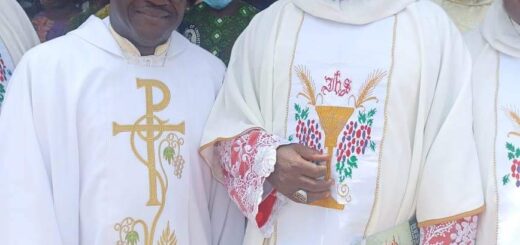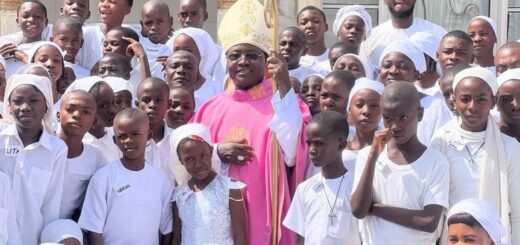God will visit His people
by ARCH BISHOP · December 17, 2022
4th Sunday of Advent (A), St. Pope John Paul II Parish, Karsana, Kubwa, Abuja, 17.12.2022.
Homily by Archbishop Ignatius A. Kaigama.
Readings: Isaiah 7:10-14; Romans 1:1-7; Matthew 1:18-25
God will visit His people
We have just one week to get to the end of the Advent Season and to commence our festive celebrations of Christmas. No doubt, frantic preparations are ongoing everywhere for a glamorous festival. The Church however asks us to make adequate spiritual preparations. We are reminded not to lose sight of Christ who is the reason for the season. We are called to embrace the coming season with an appropriate moral and spiritual disposition. Our principal focus should be on Christ; not rejecting His love and remaining persistent in sin.
Our first reading shows the circumstances surrounding the prophecy of the virgin birth of Jesus. After the death of King Solomon, Israel became divided into a northern kingdom (Israel) and a southern kingdom (Judah). Now Ahaz, King of Judah was threatened by forces of Syria, represented by Rezin, the king of Syria and Pekah, king of Israel (northern kingdom) to attack Jerusalem, the capital of Judah (southern kingdom). He and his people were put into confusion and fear. Ahaz had no trust in God and so resorted to seeking help from the Assyrian forces and from their idols. Prophet Isaiah pointed to God’s intervention to bring peace and said, “The Lord himself will give you a sign. Behold, the virgin shall conceive and bear a son, and shall call his name Immanuel” (Is. 7:14).
We shall soon be celebrating that God came among us in the flesh, made Himself tangible, approachable and touchable; loving us with His ever generous love and even accepted to walk the path of the cross as a concrete act of God’s love for us. For this reason we must not become complacent and distant from God. We must also be drawn to those in our midst who are suffering or marginalized or in captivity (especially the victims of bandits and kidnappers). We should avoid the mistake of King Ahaz who instead of putting his trust in God rather chose to trust in human means by making an ungodly alliance with Assyria.
The gospel today places before us two unique personalities to emulate: St. Joseph and the Blessed Virgin Mary. Joseph found out that Mary was with child. Deuteronomy 22:23-24 prescribes death by stoning for a betrothed wife found with a child not belonging to her husband, but Joseph, being a man of honour, chose instead to divorce her quietly. He chose not to expose Mary to ridicule. As Joseph was considering this, the angel came to him in a dream and instructed him not to do such. “When Joseph awoke from sleep, he did as the angel of the Lord commanded him; he took her as his wife” (Mt. 1:24). As for Mary, she gave a prompt, total and wholehearted response to the will of God: “Behold the handmaid of the Lord; be it unto me according to thy word.” (Lk. 1:38).
Joseph and Mary both cooperated fully with God’s plan. They teach us to be faithful servants of God and stewards of His mystery. There is a saying that “man proposes God disposes.” This means that God may decide to alter our plans like that of Mary and Joseph. Like them, we should simply say, “do with us whatever you will?” Unfortunately, we often prefer to have our will done and sometimes in prayer instead of begging and pleading with God, we command Him or give Him an ultimatum. Let us learn from the obedience of Joseph who at God’s command took Mary as his wife (cf. Mt. 1:24); led the Holy Family to escape Herod’s wrath by fleeing to Egypt (cf. Mt. 2:13); returned to Israel after the death of Herod (cf. Mt. 2:21) and settled in Nazareth (cf. Mt. 2:22, Is. 11:1).
There is something to learn in the contrasting personalities of King Ahaz in the first reading and St. Joseph in the gospel reading. In the face of crisis, we see how Ahaz relied on his own strength and unholy alliances to protect Judah. But Joseph relied on God alone and trusted in Him wholeheartedly. While Ahaz sacrificed his own son and offered sacrifices to other gods in a futile attempt to protect Judah (cf. 2 Kgs. 16:3), Joseph spent his life in protecting his foster-son, Jesus.
There is something to learn too about dreams. Many of us take our dreams as if they are a gospel message. We forget that dreams are a product of our unconscious mind and imagination. To pay too much attention to them is foolhardy. The inspired writer of Sirach wrote: “dreams give wings to fools.” (Sir. 34:1). Yes, some dreams in some rare cases are inspired visions from heaven. Mary and Joseph were “warned in a dream” not to return to Palestine during the reign of Herod. The wife of Pilate warned him to release Jesus “for I have suffered much over him today in a dream” (Mt. 27:19). Because you see someone in your dream and when you suffer a misfortune you attribute it to the person is pure superstition.
St. Paul in the second reading shows how God has been faithful to His promises and challenges us to accept Jesus and teaches that when we face trials or challenges of different kind – family problems, unemployment, insecurity, health challenges, political instability, etc, we must strive to remain trusting, prayerful, obedient and faithful like St. Joseph.
May the Lord make you the Parish Priest, Fr. Sebastian Musa, and the resident priest, Rev Fr. Peter Kamai, the 105 candidates for confirmation, and indeed all parishioners of St. Pope John Paul II Parish, Karsana, Kubwa, to be men and women of spiritual honour, trusting, prayerful, obedient and faithful like St. Joseph. Let us be well prepared to receive Jesus. Maranatha (Come Lord Jesus).




